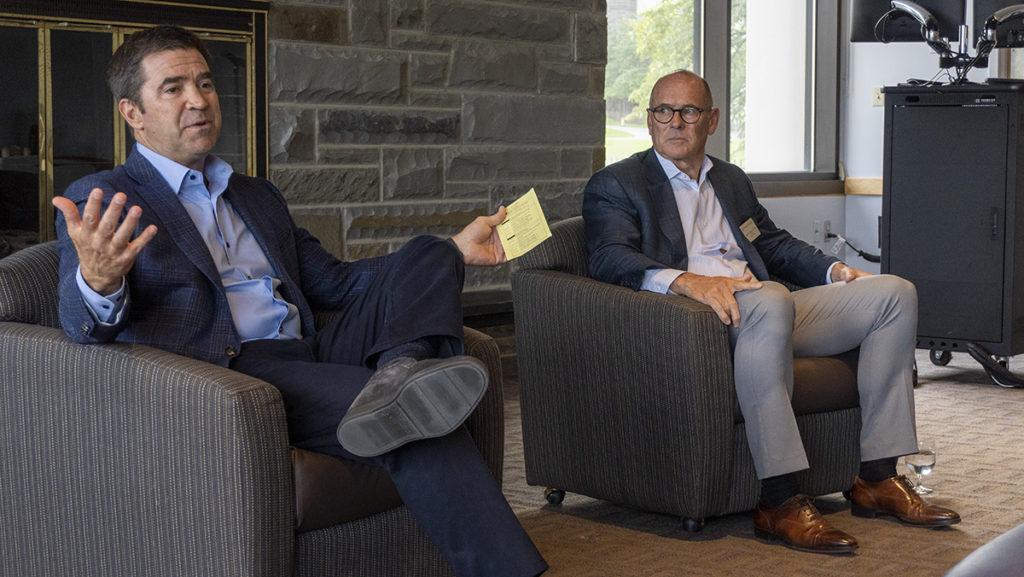David Lissy ’87, chair of the Board of Trustees, and James Nolan ’77, vice president of the board, visited with Ithaca College students, staff and faculty Sept. 30 in order to answer questions about what the board is focusing on for the 2022–23 academic year.
About 25 people met in the Clarke Lounge for the in-person meeting with the two board members. Some faculty that attended included Bryan Roberts, associate dean for the Roy H. Park School of Communications; Charis Dimaras, professor in the Department of Music Performance; Angélica Carrington, director for the Center of Inclusion, Diversity, Equity, and Social Change (IDEAS); and Hongwei Guan, associate professor in the Department of Health Promotion and Physical Education.
The board members discussed how philanthropic sources can be diversified, how student retention can be increased and how the college’s resources were affected because of the COVID-19 pandemic.
Lissy and Nolan began the meeting by discussing how the college receives most of its funds from reserves and donors — donors who sometimes become trustee board members for the college — or from philanthropic sources like people who donate money on Giving Day, or through the Division of Philanthropy and Engagement at the college. Carrington asked how the college can diversify their funding from philanthropists, since she said it seems that the majority of donors are white.
Lissy said anyone who wants to give can, no matter the amount. He said he and the board would be welcome to hearing new ideas about how they can increase their diversity from philanthropic donors.
Nolan said in order for more diverse donors to be acknowledged by the college, there needs to be someone who will open that door for them.
“In my experience, many times it takes a champion,” Nolan said. “It takes somebody saying, ‘Look, this is the perspective that I have, and I have these kinds of contacts, and I want to champion this kind of initiative.’ And that’s what makes the difference.”
Roberts asked about student retention and what the college could do better in the future.
The college has seen a recent decline in retention rates because of the pandemic, especially a decrease in third semester rates from 84% in 2020 to 83% in 2021, according to the college’s Office of Analytics and Institutional Research.
Lissy said this is something that has troubled the college since before the pandemic, but has always been high on the agenda for the board.
“The board is focused on enrollment, but we are incredibly focused on retention,” Lissy said. “For a long time, this has been an issue for Ithaca College. We should be better in terms of our graduation rate, our fifth semester retention and third semester retention. For as long as I’ve been on the board, it’s never been where it ought to be.”
First-year student Dante Conde, a senator-at-large for the Student Governance Council, asked what future projects the board is planning to implement in the foreseeable academic year and the long-term success of the college.
Lissy responded by explaining that the board is trying hard to get the Textor Hall steps redone, and how the board of trustees has dealt with the challenges of the pandemic, like the 2021 decrease in student population as many students did not want to pay the cost of tuition for virtual classes, and losing many staff members in “The Great Resignation.”
“I wholeheartedly believe that Ithaca College’s best days lie ahead,” Lissy said. “We have to deal with the ramifications that are left over by COVID; small classes that came into the college, hopefully being replaced by larger classes this year, and that’ll work its way through the system. We have the financial wherewithal to survive the tougher times we’re in right now.”
Many of the questions Lissy and Nolan were asked had to do with aspects of running the college that the board of trustees has no role in, like what goes into planning a course, making the curriculums for each of the schools, or how many days a course takes place in a semester. To clarify, Lissy explained the board’s role in the college.
“The board selects and hires a president, receives donated money, approves an annual budget and is overall responsible for the financial health and wellbeing of the college,” Lissy said. “Essentially the survival of the college is in our hands.”
Without visiting campus, Lissy and Nolan said it can be easy for the board members to lose touch with the students, programs and opportunities they help to fund. In order to ensure that this does not happen, the board has a shared governance policy and also goes through an immersion process to attend classes and meet students when it meets three times per year.
The shared governance policy signifies that not only do board members vote on the important financial affairs of the college, but that faculty and students also have a vote that counts just as high as a board member’s.
One final comment from the audience came from Roberts, who said the dynamics between the five deans has grown to a level where all five schools look forward to working with each other like never before.
There are three new deans out of the five schools at the college: Amy Falkner at the Roy H. Park School of Communications, Anne Hogan is the inaugural dean for the School of Music, Theatre, and Dance, and Michael Johnson-Cramer at the School of Business. These new deans came after the college experienced several years of interim deans in these schools.
“I’ve never seen such dynamic leadership between every school, and we’re committed to working together,” Roberts said. “So I’d say that the future is really bright for IC. For those of you who haven’t been so engaged in the past, now is the time to engage.”










